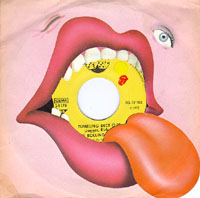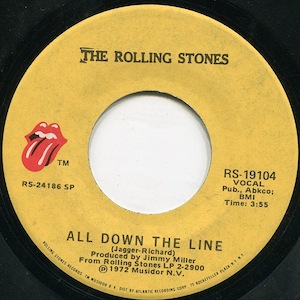
Sir Michael Philip Jagger is an English singer. He is the front man and one of the founder members of the rock band the Rolling Stones. Jagger has written most of the band's songs alongside lead guitarist Keith Richards; their songwriting partnership is one of the most successful in history, and they continue to collaborate musically. His career has spanned over six decades, and he has been widely described as one of the most popular and influential front men in the history of rock music. His distinctive voice and energetic live performances, along with Richards' guitar style, have been the Rolling Stones' trademark throughout the band's career. Jagger gained notoriety for his romantic involvements and illicit drug use, and has often been portrayed as a countercultural figure.

Keith Richards is an English musician, songwriter, singer and recording producer who is an original member, guitarist, secondary vocalist, and co-principal songwriter of the Rolling Stones. His songwriting partnership with the band's lead vocalist Mick Jagger is one of the most successful in history. His career spans over six decades, and his guitar playing style has been a trademark of the Rolling Stones throughout the band's career. Richards gained press notoriety for his romantic involvements and illicit drug use, and he was often portrayed as a countercultural figure. First professionally known as Keith Richard, by the early 1970s he had fully asserted his family name.

Exile on Main St. is a studio album by the English rock band the Rolling Stones, released on 26 May 1972 by Rolling Stones Records. The 10th released in the UK and 12th in the US, it is viewed as a culmination of a string of the band's most critically successful albums, following Beggars Banquet (1968), Let It Bleed (1969) and Sticky Fingers (1971). Exile on Main St. is known for its murky, inconsistent sound due to more disjointed musicianship and production, along with a party-like atmosphere heard in several tracks.

Metamorphosis is the third compilation album of the Rolling Stones music released by former manager Allen Klein's ABKCO Records after the band's departure from Decca and Klein. Released in 1975, Metamorphosis centres on outtakes and alternate versions of well-known songs recorded from 1964 to 1970.

"Tumbling Dice" is a song by the English rock band the Rolling Stones. It was released worldwide as the lead single from the band's 1972 double album Exile on Main St. on 14 April 1972 by Rolling Stones Records. A product of Mick Jagger and Keith Richards' songwriting partnership, the song contains a blues and boogie-woogie-influenced rhythm that scholars and musicians have noted for its unusual tempo and groove. The lyrics are about a gambler who cannot remain faithful to any woman.
"Sweet Black Angel" is a song by the Rolling Stones, included on their 1972 album Exile on Main St. It was also released on a single as the B-side to "Tumbling Dice" prior to the album. The song features a West Indian rhythm.
"Gimme Shelter" is a song by the English rock band the Rolling Stones. Written by Jagger–Richards, it is the opening track of the band's 1969 album Let It Bleed. The song covers the brutal realities of war, including murder, rape, and fear. It features prominent guest vocals by American singer Merry Clayton.

"Happy" is a song by the English rock band the Rolling Stones from their 1972 album Exile on Main St. Featuring guitarist Keith Richards on lead vocals, it was released as the second single from the album in June 1972, entering the Billboard Hot 100 at No. 69 on 15 July 1972 and reached No. 22 on 19 August 1972.
"Connection" is a song by the English rock band the Rolling Stones, featured on their 1967 album Between the Buttons. It was written by Mick Jagger and Keith Richards, features vocals by both and is said to be about the long hours the band spent in airports. The lyrics contain much rhyming based on the word connection. The lyrics also reflect the pressures the band was under by 1967:
My bags they get a very close inspection, I wonder why it is that they suspect 'em, They're dying to add me to their collection, And I don't know, If they'll let me go
"Sweet Virginia" is a song written by Mick Jagger and Keith Richards, and was the sixth song on the Rolling Stones' 1972 double album Exile on Main St. The song is a slow country-inspired composition with a saxophone solo.
"Salt of the Earth" is the final song from English rock band the Rolling Stones album Beggars Banquet (1968). Written by Mick Jagger and Keith Richards, the song includes an opening lead vocal by Richards. It is the second official track by the group to feature him on lead vocal.
"Stray Cat Blues" is the eighth song on the Rolling Stones' album Beggars Banquet. It was written by Mick Jagger and Keith Richards and produced by Jimmy Miller. Miller's production of the song is very representative of his style, featuring a very prominent hi hat beat, droning piano performed by Nicky Hopkins, a mellotron performed by Brian Jones, all electric guitars performed by Richards and vocals from Jagger kept even in the mix. According to Mick Jagger, the song was inspired by "Heroin" by the Velvet Underground, with the intros of both songs being particularly similar.

"Far Away Eyes" is the sixth track from the English rock band the Rolling Stones' 1978 album, Some Girls. It was released, as the B-side of the single "Miss You", on Rolling Stones Records, on 9 June 1978. Rolling Stone magazine made it the 73rd song on their list of 100 Greatest Rolling Stone's Songs.
"Shine a Light" is a song released by English rock band the Rolling Stones on their 1972 album Exile on Main St. about founding band member Brian Jones and was subsequently reworked and released after his 1969 death.

"Memo from Turner" is a solo single by Mick Jagger, featuring slide guitar by Ry Cooder, from the soundtrack of Performance, in which Jagger played the role of Turner, a reclusive rock star. It was re-released in October 2007 on a 17-song retrospective compilation album The Very Best of Mick Jagger, making a re-appearance as a Jagger solo effort. After its original release in 1970, it was included on Rolling Stones compilations, such as Singles Collection: The London Years as a track credited to the Jagger/Richards songwriting partnership. "Memo from Turner" was ranked No. 92 in the 100 Greatest Guitar Songs list of Rolling Stone.
"Rip This Joint" is the second song on the Rolling Stones' classic 1972 album Exile on Main St. Written by Mick Jagger and Keith Richards, "Rip This Joint" is one of the fastest songs in the Stones' canon, with a pronounced rockabilly feel. Jagger's breakneck delivery of the song's lines spells out a rambling tale set across America from the perspective of a foreigner.

"All Down the Line" is a song by the English rock band the Rolling Stones, which is included on their 1972 album Exile on Main St.. Although at one point slated to be the lead single from the album, it was ultimately released as a single as the B-side of "Happy".
"Torn and Frayed" is a song by the Rolling Stones that appears on their 1972 album Exile on Main St. Written by Mick Jagger and Keith Richards. In his review of the song, Bill Janovitz called it "a twangy, three-chord honky tonk, but not typically country", and said, "The progression of the chords brings gospel music to mind".
"I Just Want to See His Face" is a song by English rock band the Rolling Stones featured on their 1972 release Exile on Main St. It is credited to Mick Jagger and Keith Richards.
"Loving Cup" is a song by the Rolling Stones, which appears on their 1972 album Exile on Main St.







